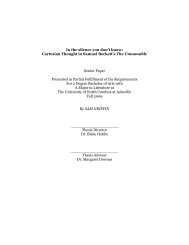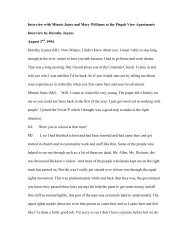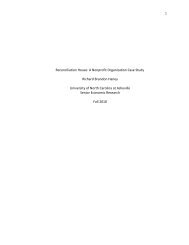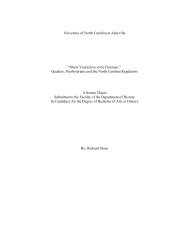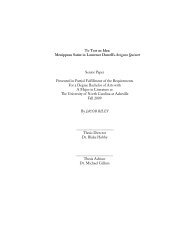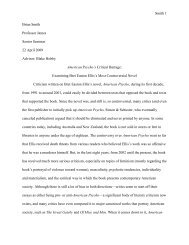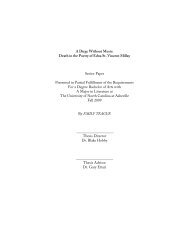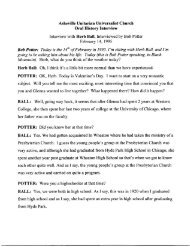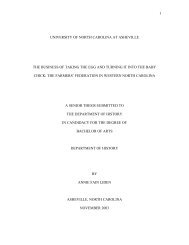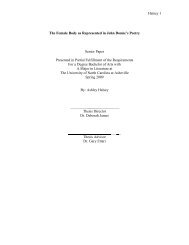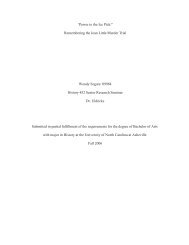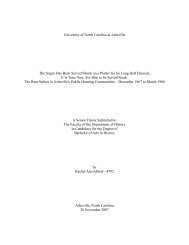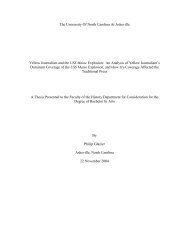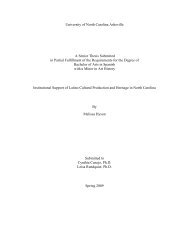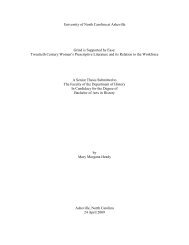Mark Twain's Writing During his Last Twenty Years: The Conflicts of ...
Mark Twain's Writing During his Last Twenty Years: The Conflicts of ...
Mark Twain's Writing During his Last Twenty Years: The Conflicts of ...
Create successful ePaper yourself
Turn your PDF publications into a flip-book with our unique Google optimized e-Paper software.
Arghiere 14<br />
mechanistic ideas with <strong>his</strong> “plan for the general betterment” <strong>of</strong> the human race. If Twain were<br />
able to achieve persuasively t<strong>his</strong> synthesis, <strong>his</strong> theory would abrogate guilt and responsibility from<br />
human affairs while preserving moral improvement. In <strong>his</strong> efforts to pardon the human race for<br />
its cruel acts, Twain recoils to a theory <strong>of</strong> determinism, <strong>of</strong>ten, more specifically, by placing blame<br />
for the cruelty <strong>of</strong> human acts not on their perpetrators but on the moral sense. In <strong>The</strong> Chronicle <strong>of</strong><br />
Young Satan, for instance, Satan says <strong>of</strong> the moral sense, “Now what advantage can [man] get out<br />
<strong>of</strong> that? He is always choosing, and in nine cases out <strong>of</strong> ten he prefers the wrong. <strong>The</strong>re<br />
shouldn’t be any wrong; and without the Moral Sense there couldn’t be any” (72-73). While<br />
Twain’s claim that the moral sense and other externally-driven influences control human<br />
behavior may, by itself, be tenable, it is hardly compatible with <strong>his</strong> hopes for humanity’s moral<br />
improvement.<br />
<strong>The</strong> perceived inability <strong>of</strong> Twain’s philosophy to reconcile moral improvement and<br />
determinism may explain <strong>his</strong> receptivity to the idea <strong>of</strong> a solipsistic reality. In <strong>his</strong> article “<strong>Mark</strong><br />
Twain’s <strong>The</strong>ology: <strong>The</strong> Gods <strong>of</strong> a Brevet Presbyterian,” Brodwin considers t<strong>his</strong> possibility: “if<br />
human character is the creation <strong>of</strong> circumstances and ‘outside’ influences, then authentic reform<br />
will never be realized. <strong>The</strong>re is little doubt that Twain recognized t<strong>his</strong> problem, which is<br />
reflected in the final attempt to achieve reform . . . by at last retreating from the ‘real’ world into<br />
solipsism” (240). Yet Twain, as John Tuckey writes in <strong>Mark</strong> Twain and Little Satan: <strong>The</strong> <strong>Writing</strong><br />
<strong>of</strong> the Mysterious Stranger, “was probably more at home in the real world than <strong>his</strong> own words<br />
would sometimes suggest,” and doesn’t appear to have completely adopted a solipsistic worldview<br />
(81). Nonetheless, Twain, as he writes in <strong>his</strong> notebooks, pondered the existence <strong>of</strong> a dream-self<br />
capable <strong>of</strong> roaming freely across time and space, “When my physical body dies my dream body<br />
will doubtless continue its excursion and activities without change, forever” (Gibson 27).



